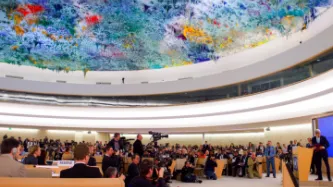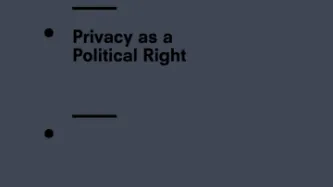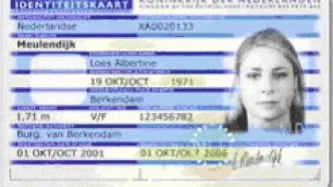Search
Content type: News & Analysis
Privacy International this week submitted stakeholder reports to the United Nations Human Rights Council1 about the human rights records of China, Senegal and Mexico. The reports, prepared in preparation with our partners in the respective countries, analyse the extent to which the right to privacy is respected and protected, and detail instances of privacy violations.
The stakeholder reports will inform the questions asked by members of the Human Rights Council when China, Senegal and…
Content type: News & Analysis
Trade has often been a positive driver in encouraging countries to adopt data protection laws, to ensure compliance and ability to conduct business with the European Union and other privacy-respecting partners. However, when free trade agreements are negotiated in secret and influenced by powerful business interests, the result is a severe watering down of existing privacy protections.
There is a high risk of this happening in the free trade negotiations between the European Union…
Content type: News & Analysis
The long-awaited release by Microsoft today of data about the number of law enforcement requests received and complied with by the company represents an important step forward in the ongoing challenge of understanding the scale of government access to communications information.
The data, the first set released by Microsoft, reveals that it received 70,665 requests for communications content and data in 2012, pertaining to 122,015 users or accounts. Communciations data was disclosed…
Content type: Advocacy
This stakeholder report is a joint submission by Privacy International (PI) and the Law and Technology Centre of the University of Hong Kong (HKU). PI is a human rights organisation that works to advance the right to privacy and fight surveillance around the world. PI has been working with HKU to conduct research and policy engagement on privacy and data protection issues in China and Hong Kong since 2009. Together, PI and HKU wish to bring concerns about the protection and promotion of the…
Content type: Advocacy
This stakeholder report is submitted jointly by Privacy International (PI), a human rights organisation that works to advance and promote the right to privacy and fight surveillance around the world. PI wishes to bring concerns about the protection and promotion of the right to privacy in Mexico before the Human Rights Council for consideration in Mexico’s upcoming review.
Content type: Advocacy
This stakeholder is a submission by Privacy International (PI) and Jonction Senegal. PI is a human rights organisation that works to advance and promote the right to privacy and fight surveillance around the world. Jonction Senegal is a human rights organisation based in Dakar, which aims to promote sustainable and equitable development and human rights both in Africa in general and in Senegal in particular. Together PI and Jonction Senegal wish to bring concerns about the protection and…
Content type: News & Analysis
We are the raw material of the new economy. Data about all of us is being prospected for, mined, refined and traded...and most of us don’t even know about it.
Every time we go online, we add to a personal digital footprint that’s interconnected across multiple service providers, and enrich massive caches of personal data that identify us, whether we have explicitly authenticated or not.
That may make you feel somewhat uneasy. It's pretty hard to manage your digital footprint if you can't even…
Content type: News & Analysis
Court Of Appeal Tells UK Government That Criminal Records Bureau Checks System Breaches Human Rights
Yesterday the Court of Appeal delivered its judgment in the case of R (on the application of T) v Chief Constable of Greater Manchester & Others concerning the operation of the criminal records check system. The court was considering three cases that hinged on the same question: whether or not the blanket requirement on those applying for jobs involving contact with children and vulnerable adults (approximately four million people each year) to disclose all past convictions,…
Content type: Report
Privacy has truly become an issue of global resonance. A quick glance at policy agendas in countries around the world shows that privacy and surveillance issues are increasingly important. The challenge, however, is improving the ability of governments and policy stakeholders to engage in a policy debate that is informed about the dangers of surveillance and the importance of protecting privacy. This is the primary objective of our Privacy in the Developing World programme.
In this report, we…
Content type: Report
Privacy has truly become an issue of global resonance. A quick glance at policy agendas in countries around the world shows that privacy and surveillance issues are increasingly important. The challenge, however, is improving the ability of governments and policy stakeholders to engage in a policy debate that is informed about the dangers of surveillance and the importance of protecting privacy. This is the primary objective of our Privacy in the Developing World programme.
In this report, we…
Content type: News & Analysis
One of the first things that strikes you about the chaotic East African metropolises of Kenya, Uganda and Zimbabwe is the blanket of adverts for mobile phone companies that covers them, from the walls of the immigration hall at Harare airport, to the rickety shacks that line the dusty streets of Kampala. Where official signage is unavailable, DIY versions are painted onto the roofs and walls of houses and small businesses. Stores selling mobile phones are rarely more than a few short steps away…
Content type: News & Analysis
Privacy International asked lawyers, activists, researchers and hackers at Defcon 2012 about some of the debates that thrive at the intersection between law, technology and privacy. We also wanted to know why privacy matters to them, and what they thought the future of privacy looked like. This video is a result of those conversations.
Featuring Cory Doctorow, Kade Crockford, Jameel Jaffer, Dan Kaminsky, Chris Soghoian, Marcia Hoffman, Moxie Marlinspike, Phil Zimmerman, Hanni Fakhoury…
Content type: News & Analysis
Let's be clear: the Open Data movement is not about the pursuit of complete and unconditional openness. We know that it would be unwise to publish details of police patrol patterns, or the combination to the safe containing the crown jewels. We believe that fundamental reference data like ordnance survey maps, transport timetables, and company information should be freely available to all - information about objects, rather than information about people. Internationally, slightly different…
Content type: News & Analysis
Anonymous proxy service HideMyAss.com - "a leading online privacy website" according to its own homepage - today admitted handing over user logs to law enforcement agencies.
We commend companies running privacy-protecting services. We need more like them. But we also need them to keep their word. Their website claims "Our free web proxy is a secure service that allows you to surf anonymously online in complete privacy" and their pro paid-for version promises that users can "…
Content type: News & Analysis
Governments have no automatic right of access to our communications. This will sound highly controversial to some, even downright radical. But the demands of national security and crime prevention do not, in fact, immediately trump every other right and responsibility in the complex relationship between citizen and state.
The recent Skype argument is a great example. Skype has always prided itself on being a secure method of communication. Businesses, government agencies, human…
Content type: News & Analysis
In Homer’s Iliad, the gods Juno and Saturn have great desire for each other, and Saturn wishes to lie with Juno on the top of Mount Ida. Juno protests Saturn’s advances, exclaiming: “What if one of the ever-living gods should see us sleeping together, and tell the others? It would be such a scandal that when I had risen from your embraces I could never show myself inside your house again”. Luckily for Saturn, Juno knows of a place with “good strong doors” where they can meet secretly and…
Content type: News & Analysis
The APEC Data Privacy Subgroup (DPS) commenced a new five year work programme at a meeting in Moscow in February 2012. This follows the commitment by APEC Leaders in late 2011 to the Cross Border Privacy Rules (CBPR) system as one way implementing the APEC Data Privacy Framework.
The Joint Oversight Panel was formed at the DPS meeting in Moscow and comprises members from the US (chair), Chinese Taipei and Mexico, with the chair of the DPS (from Canada) as alternate – who will…
Content type: Report
Following on from their 2009 discussion paper, in 2010 the European Commission published a Communication on changes to the 1995 European Union Directive on data protection. The European Union’s 1995 Directive on data protection is a leading regional instrument for privacy and is often the model for other countries across the globe. The Directive has been integral to pushing back against key surveillance and tracking initiaitives by governments and industry.
In this report we respond to that…
Content type: Report
When we think of privacy in the political system we tend to recall historic events
like Watergate, secret files held by governments in war-time, and blacklists. Modern political surveillance is more advanced and sophisticated. In this report we identify some of the modern political surveillance initiatives by governments around the world. We must recognise that all political systems require privacy to function, and devise our policies and build our technologies accordingly.
Content type: Report
When we think of privacy in the political system we tend to recall historic events like Watergate, secret files held by governments in war-time, and blacklists. Modern political surveillance is more advanced and sophisticated. In this report we identify some of the modern political surveillance initiatives by governments around the world. We must recognise that all political systems require privacy to function, and devise our policies and build our technologies accordingly.
Content type: Report
Following on from their 2009 discussion paper, in 2010 the European Commission published a Communication on changes to the 1995 European Union Directive on data protection. The European Union’s 1995 Directive on data protection is a leading regional instrument for privacy and is often the model for other countries across the globe. The Directive has been integral to pushing back against key surveillance and tracking initiaitives by governments and industry.
In this report we respond to that…
Content type: News & Analysis
PI spent the first half of February in Asia, visiting our regional partners and speaking at events. Our trip began in Delhi, where the Centre for Internet and Society (in collaboration with the Society in Action Group) had organized two consecutive privacy conferences – an invite-only conclave on Friday 3rd February and a free symposium open to the public on Saturday 4th February. The conclave consisted of two panels, the first focusing on the relationship between national security…
Content type: Press release
In an advertisement placed in national newspapers yesterday (23rd February), the National ICT R&D Fund of Pakistan (which operates under the auspices of the Ministry of Information Technology) requested proposals for "the development, deployment and operation of a national level URL Filtering and Blocking System". Further information provided on the Fund's website stated:
"Internet access in Pakistan is mostly unrestricted and unfiltered...Many countries have deployed web…
Content type: News & Analysis
Last year, Index on Censorship published an interview with Google’s chief legal officer and senior vice president David Drummond. The company was still reeling from the aftermath of the news that an attack had been launched on Gmail from China. Drummond proposed that free speech needed to be part of the international agenda at multilateral and bilateral trade discussions, just like piracy. 'Western governments whose economies certainly benefit from the internet sector should make this happen,'…
Content type: News & Analysis
The second 2011 meeting of the APEC Privacy Subgroup took place in San Francisco in mid September, and finalised the package of documents that comprise the Cross Border Privacy Rules (CBPR) system. Endorsed by the parent Electronic Commerce Steering Group (ECSG), these will now go forward for ratification by Ministers in Hawaii in November, and subsequent implementation. The Subgroup’s 2012 Work Plan envisages establishment of the Joint Oversight Panel (JoP), commencement of…
Content type: News & Analysis
Nigel Waters has previously represented Privacy International at APEC Data Privacy Subgroup meetings, on one occasion with PI having official guest status, otherwise indirectly through membership of the Australian delegation. On this occasion, expenses were paid by USAid for participation in the technical assistance seminar, and this allowed attendance at the other meetings.
Cross border privacy rules
As a reminder, or for newcomers, the cross border privacy rules (CBPR) system is one…
Content type: News & Analysis
Not since the 1990s has the internet been so exciting. With its use by political activists and journalists around the world, we can now again entertain the discussions that the internet brings freedom. Digital data traverses routers with little regard to national boundaries and so traditional constraints not longer apply. So it is no surprise that protestors on the streets of Tehran or Cairo are using the internet to organise. We like to believe in the freedom of the internet again, after…
Content type: News & Analysis
Under the Terrorism Act 2000, police agencies in the UK have the power to stop and search within ‘security zones’ as established under order by the Home Secretary. Since February 2001, London has been designated as a security zone.
When this power was used in 2003 at a London protest against the arms trade, the protestors appealed to the courts on privacy grounds. The UK House of Lords ruled that although a stop and search in public was possibly an interference under Article 8(1) of the ECHR,…
Content type: News & Analysis
‘Indymedia’ (IMC) describes itself as ‘a network of individuals, independent and alternative media activists and organisations, offering grassroots, non-corporate, non-commercial coverage of important social and political issues.’ According to Indymedia, its content is widely read, with the transfer of over 3.2 terabytes of information a month, serving over 18 million page views a month.
On October 7, 2004, over 20 websites administered by the Independent Media Center were taken off-line. This…
Content type: News & Analysis
Privacy International is writing this Open Letter to Members of both Chambers of the Netherlands Parliament to express our deep concern over Justice Minister Donner's proposed 'Wet op de uitgebreide identificatieplicht'. We believe these requirements will violate the European Convention on Human Rights and the UN Convention on the Rights of the Child.
By way of introduction, Privacy International (PI) is a human rights group formed in 1990 as a watchdog on surveillance by governments and…




























